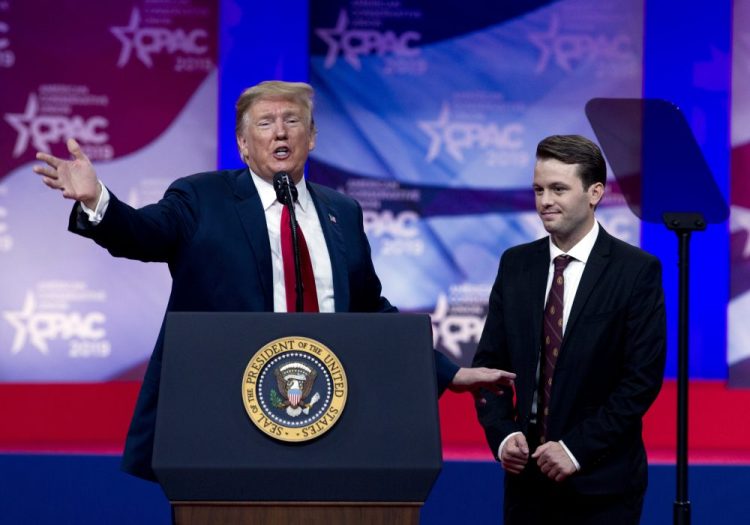President Donald Trump will sign an executive order on Thursday requiring U.S. colleges to certify that they protect free speech on their campuses or risk losing federal research funding, White House officials said.
Trump initially proposed the idea during a March 2 speech to conservative activists, highlighting the case of Hayden Williams, an activist who was punched in the face while recruiting for the group Turning Point USA at the University of California, Berkeley. At the time, Trump said that Williams “took a hard punch in the face for all of us.”
The order tells federal agencies to work with Office of Management and Budget to ensure that colleges receiving research grants “promote free inquiry, including through compliance with all applicable federal laws, regulations and policies.” White House officials say it will apply to more than $35 billion in grants.
Public universities pursuing federal funding would have to certify that they comply with the First Amendment, which already applies to them. Private universities, which have more flexibility in limiting speech, would need to commit to their own institutional rules.
How the government will enforce the order and what type of violation could trigger a loss of funding are still unclear. White House officials declined to provide specific examples and said implementation details will be finalized in coming months. In the Feb. 19 case at Berkeley, neither Williams nor the man arrested for the attack was affiliated with the university.
The order adds no new obligations for schools but attaches strings to rules they’re already told to uphold. Colleges already are required to certify that they meet certain conditions in order to receive federal grants, and free speech protection would simply be added to the list.
Leaders of some colleges have said the order is unnecessary, and some fear it won’t be enforced evenhandedly.
Trump’s son Donald Trump Jr. on Twitter called it a “momentous day,” saying the order will “protect free speech rights for ALL students.” He gave credit to Turning Point USA and its founder, Charlie Kirk, adding that Kirk has “been pushing this since the first time I met him years ago.”
Kirk has been among a growing chorus of conservatives who say their voices are stifled on college campuses. The debate has flared following a string of high-profile cases in which speakers have been shut down or heckled, including at UC Berkeley and at Middlebury College in Vermont. Often, protesters have targeted conservative speakers.
Republicans in Congress called multiple hearings on campus free speech when they controlled both chambers, and members of Trump’s Cabinet have called for action on the issue, including Education Secretary Betsy DeVos and former Attorney General Jeff Sessions.
But many colleges say they already have strong free speech policies and don’t need an executive order. After Trump’s earlier proposal, the University of California issued a statement calling the order “misguided and unnecessary.” President Robert Zimmer of the University of Chicago, a champion of free speech, said an executive order would be “a grave error” and could actually chill free speech.
Some higher education leaders worry the order will backfire. If a speaking event threatens to turn violent, for example, some say they might have to choose between canceling the event for safety and allowing it to continue to preserve federal funding. Some say it could force religious universities to host speakers with views that conflict with the universities’ values.
Still, the order has gained support from some religious institutions including Liberty University, a Christian school in Virginia whose leaders say they denounce censorship of either the left or right.
Separate from the free speech requirement, the order also calls for several measures meant to promote transparency in the student loan industry and in how well colleges prepare students.
By January 2020, Trump is directing the Education Department to create a website where borrowers can find better information about their loans and repayment options, and he’s calling on the agency to expand its College Scorecard website to include data on the graduates of individual college programs, including their median earnings, loan debt and their default rates.
Trump, a Republican, also is asking the Education Department to prepare a policy that would make sure colleges “share the financial risk” that students and the federal government take on with federal student loans.
Send questions/comments to the editors.



Comments are no longer available on this story